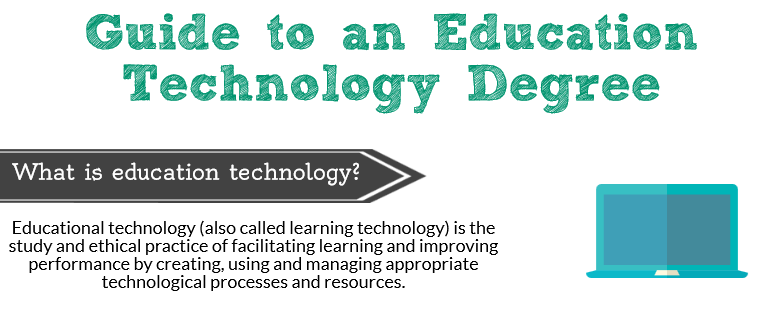 Education technology specialists develop and integrate technology for use in the classroom. This could also mean designing online courses or even building education websites.
Education technology specialists develop and integrate technology for use in the classroom. This could also mean designing online courses or even building education websites.
Since we know you have lots of questions about going back to school online, we have written this quick, easy-to-read "Mini-Guide to Education Technology Degrees Online" to help give you the facts that you need to make the right choice for you.
Browse Online Education Technology Degrees
1. What is the study of education technology?
"Educational Technology, often referred to as "EdTech," is the study and practice of designing effective instruction using technology, media, and learning theory." [1]
2. Is an online degree in education technology right for me?
A degree in education technology might be right for you if you already have experience in education, computers and software. Educators with previous experience and skill in training, development, planning, organization and technology, particularly distance learning technology, are also good candidates for education technology as a field of study and a career.
3. What are the educational requirements to become a specialist in educational technology?
Many of those working in education technology or instructional technology already have a background in teaching or experience in a classroom setting. They may also have experience in working with various educational technologies prior to taking coursework in the field. The minimum educational requirement for those working in education technology is a master’s or doctoral degree in educational or instructional technology, although talented individuals with a bachelor’s degree and experience in a technology field, particularly web and courseware design, may be considered for some positions.
Educational technology specialists who work in public education settings may also be required to obtain and hold a state teaching license, and take ongoing continuing education courses in order to keep their skills current to meet the changing needs of schools. This may include additional computer and software training.
4. What are some courses I might take to earn a degree in education technology?
Here are some courses you might take to earn a degree in education technology:
- Technology Planning
- Technology Applications for the Classroom
- Research in Instructional Technology
- Instructional Design
- Multimedia Productions
- Interactive Technologies
- Distance Communications
- Emerging Internet Technologies
5. How can I further specialize my degree in education technology?
Here are some possible degree concentrations within education technology:
- Curriculum and Instruction: Technology
- Information Technology Education
- Literacy and Technology
- Technology Integration
- Instructional Design and Technology
- Digital Learning
- Instructional Technology
- Education Media Design and Technology
- Teaching and Learning With Technology
- Learning Technologies
- Technology and E-Learning
6. What are some example jobs in education technology?
Here are just a few types of jobs in education technology:
- Educational Software Consultant
- Training Specialist
- Course Developer
- Director of Distance Education
- Corporate Trainer
- Technology Resource Instructor
- Educational Technology Support
- District-Level Technology Coordinator
- Coordinator of Assistive Technology
- Instructional Program Manager
- Director of Academic Technology Services
- Director of Information Technology
- Technology Consultant
- Technology Director
- Instructional Technology Specialist
- Technology Coordinator
- Media Specialist
- Technology Lead
- Education Technologist
- Technology Integration Specialist
- Instructional Designer
7. What is the work environment like for an education technology specialist?
The careers available to graduates of education technology programs are incredibly diverse. They may work in public school systems as curriculum or instructional design specialists, or they may work in the private sector as web developers, corporate trainers or distance education technologists. Job duties may include designing educational software and web sites, or actually teaching computer technology to students.
The work environment of a education technology graduate varies, depending upon the particular job field they enter, and whether they are working in a school, government or corporate environment. The job can involve working long hours, and unlike teachers and other school administrators, working year-round. They may also spend a lot of time traveling to different schools to meet with teachers and administrators. The work can be stressful because of the varied duties and their accountability to administrators. However, work in educational technology can be very rewarding, as it has a direct impact on the quality of education in the classroom and in distance learning programs.
8. What is the earning potential for educational technology specialists?
According to Salary.com, the annual median salary of an education technology specialist is $53,077. [2]
[1]marlboro.edu/academics/graduate/mat/what_is_teaching_with_technology | [2] salary.com/Instructional-Technology-Specialist-Salary.html
